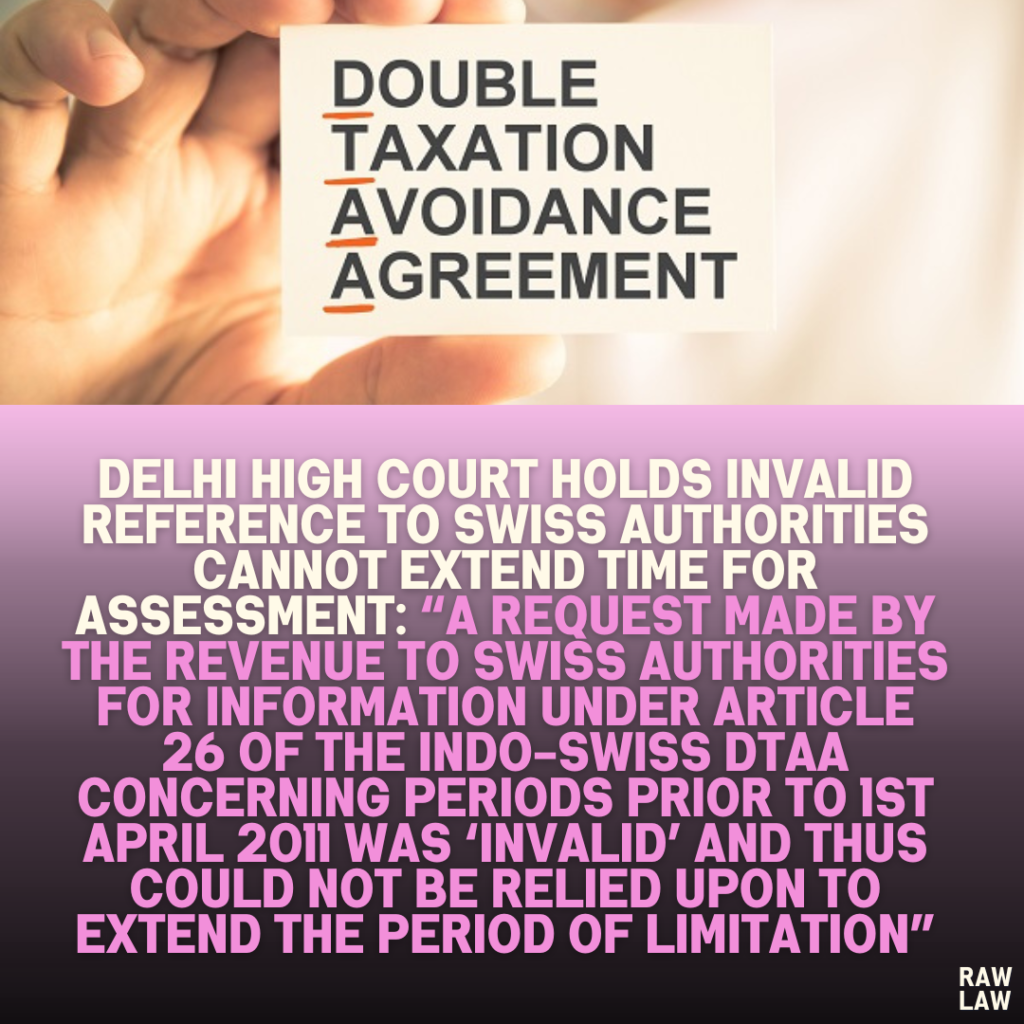Court’s Decision
The Delhi High Court dismissed a batch of 29 income tax appeals filed by the Revenue under Section 260A of the Income Tax Act, 1961. The Court upheld the decisions of the Income Tax Appellate Tribunal (ITAT), which had quashed assessment and penalty orders on the ground that they were barred by limitation under Section 153B of the Act.
The core ruling was that a request made by the Revenue to Swiss authorities for information under Article 26 of the Indo-Swiss Double Taxation Avoidance Agreement (DTAA) concerning periods prior to 1st April 2011 was “invalid” and thus could not be relied upon to extend the period of limitation. The Court held:
“An invalid reference cannot be considered for extension of the limitation period under Clause (ix) of the Explanation to Section 153B of the Act.”
Facts
- The respondents (assessees) were subjected to search and seizure operations under Section 132 of the Act on 28.07.2011.
- Assessment orders were passed under Section 153A read with Section 143(3).
- The Revenue received information regarding the assessees’ alleged foreign bank accounts in HSBC, Geneva.
- A reference was made by the competent authority to the Swiss authorities on 11.06.2013 seeking information under the Indo-Swiss DTAA.
- The Swiss authorities refused the request via communication dated 02.07.2019, citing that the agreement did not apply to information before 01.04.2011.
- The ITAT held that since the reference was invalid, the benefit of extension of time under Section 153B was not available.
- The Revenue challenged this conclusion in appeal before the High Court.
Issues
- Whether the ITAT was correct in holding that the assessment orders were time-barred without examining the merits.
- Whether an invalid reference made under Article 26 of the Indo-Swiss DTAA for a period prior to 01.04.2011 could extend the time under Section 153B.
Petitioner’s Arguments (Revenue)
- The Revenue argued that it had made a valid reference to the Swiss authorities under Article 26 of the DTAA.
- In terms of Clause (ix) of the Explanation to Section 153B, the period of one year from the date of making the reference should be excluded in computing the limitation period.
- The substitution of Article 26 in the DTAA did not negate the existing rights to seek information for earlier years.
Respondent’s Arguments (Assessees)
- The respondents contended that the reference made by the Revenue was invalid as the amended Article 26 applied only to fiscal years beginning on or after 01.04.2011.
- The substituted Article 26 under the Protocol signed on 30.08.2010 expressly excluded information relating to years prior to 01.04.2011.
- As the request was made after 30.08.2010, the earlier version of Article 26 was no longer applicable.
Analysis of the Law
- Clause (ix) of the Explanation to Section 153B allows exclusion of one year or the actual period taken (whichever is less) if a reference for exchange of information is made under Section 90 or 90A.
- The Court examined whether the reference made to Swiss authorities post-2010 could be valid for years before 2011.
Precedent Analysis
- The Court distinguished earlier High Court and ITAT decisions that dealt with special audit references under Section 142(2A), which were also held to not extend limitation if found to be invalid.
- The Court relied on principles laid down in:
- Koteswar Vittal Kamath v. K. Rangappa Baliga & Co. (1969)
- Zile Singh v. State of Haryana (2004)
- Firm A.T.B. Mehtab Majid & Co. v. State of Madras (1962)
- Pernod Ricard (India) Pvt. Ltd. v. State of M.P. (2024)
These cases reaffirm that substitution of a clause in law or treaty extinguishes the earlier provision and that an invalid order cannot extend statutory timelines.
Court’s Reasoning
- The earlier Article 26 (relating to exchange of information) ceased to exist after 30.08.2010 upon the signing of the Amending Protocol.
- The amended Article 26 applied only to information from fiscal year 2011-12 onwards.
- As the Revenue’s request for information pertained to AYs 2006-07 to 2010-11, it was outside the scope of Article 26.
- The Court observed:
“Article 26 as it existed prior to 30.08.2010 ceased to exist, and any request under that Article cannot be made after 30.08.2010.”
- Hence, no valid reference existed under DTAA that could trigger the exclusion under Section 153B Explanation (ix).
Conclusion
- The High Court held that the ITAT was right in concluding that the assessment and penalty orders were time-barred.
- The reference made by the Revenue under the DTAA was not valid for periods prior to 01.04.2011.
- Thus, the Revenue could not claim benefit of extension of limitation.
Implications
- The judgment clarifies that Revenue authorities cannot extend limitation periods under Section 153B by relying on invalid or inapplicable references under DTAAs.
- This ruling may affect other assessments where references were made under substituted treaty provisions for earlier fiscal periods.
- It reinforces the principle that substitution of treaty provisions extinguishes earlier clauses unless explicitly saved.



